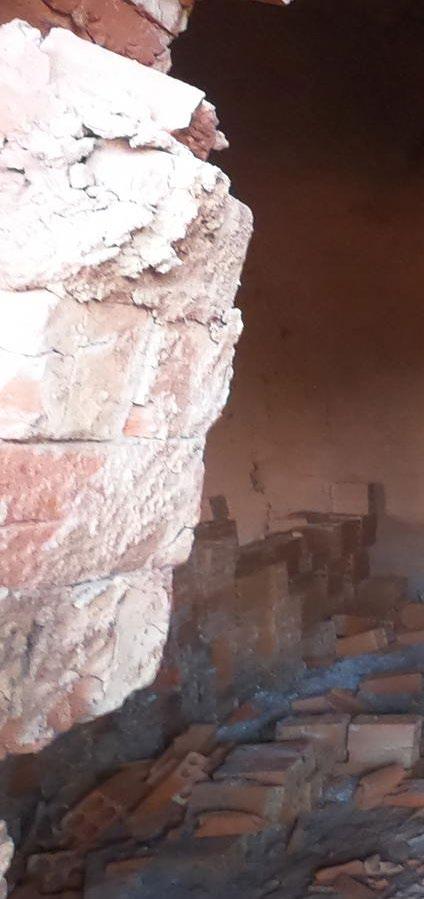
23 minute read
WaterAid’s COVID-19 Response
At the beginning of FY20/21, the COVID-19 pandemic began to rapidly spread globally.
Whilst we had already been working to scale up our water, sanitation and hygiene (WASH) programs, the ongoing threat of the virus in countries globally, some with incredibly fragile health systems, saw our teams show great resilience as they adapted the majority of WaterAid’s work to respond to COVID-19.
Advertisement
Working at all levels within the country, from rural communities through to government ministers and departments, we focused on ensuring people were aware and prepared for COVID-19. At a community level, the team coordinated with the Provincial Health Authority and conducted community outreach, which involved our teams travelling into hard to reach places to ensure even the most remote communities were informed on what the virus was and that washing hands with soap and water was the first line of
defence against the pandemic.
Our teams also used loud speakers to drive through villages and share COVID-19 awareness and preparedness messages more widely and for people unable to read. A key element WaterAid considered in this response was that COVID-19 could disproportionately affect marginalised and vulnerable people, focusing on known marginalised and vulnerable working environments. The team identified constructionand brickworkers as particularly vulnerable due to their living and working conditions. The team collaborated with the Ministry of Rural Development (MRD), the sub-national government and factory owners and management to respond to the pandemic to protect this vulnerable group, and the communities where they worked and lived.
WaterAid Cambodia and partners supported the development of new and existing COVID-19 educational materials and delivering these key messages, ensuring communities and workers had adequate knowledge on COVID-19 prevention. This joint response reached over 23,000 workers in eight target factories. “During this pandemic, I received COVID-19 education materials from WaterAid, those materials are useful for me and other workers. The basic WASH training and hygiene awareness WaterAid provided help us to continue to provide the knowledge to our workers. I observe workers practice washing hands with soap more often.”
- Ms. Dany, HR officer of Starite Factory.
WaterAid/ Korn Kun
A man in the Samaki Meanchey district and commune using a new low-cost handwashing facility, in front of posters promoting handwashing with soap during COVID-19 outbreak.


Hygiene materials such as soap and lack of basic handwashing facilities and clean water were a large concern for brick workers in Cambodia.
Papua New Guinea
A second wave began in Papua New Guinea (PNG) in March 2021 and quickly became a very serious situation. Given PNG’s fragile health systems and with large-scale distribution of vaccines some time away, a safe and reliable water supply and handwashing with soap was still the first line of defence against the spread of COVID-19.
During the past financial year, WaterAid scaled up our already existing COVID-19 and water, sanitation and hygiene (WASH) work in PNG, focusing on COVID-19 preventative measures, provision of water supply in communities and schools and national hygiene promotion, including handwashing with soap.
WaterAid worked closely with the Wewak District Development Authority (DDA) and East Sepik Provincial Health Authority (ESPHA) to strengthen the government’s approach to COVID-19 awareness and community preparedness and ran direct community outreach, creating six teams who undertook COVID-19 awareness and preparedness across Wewak District. This included training locals to make soap from locally available products such as coconut oil.
The teams visiting communities included key government staff, health promotion officers, community health workers, security and police. Several teams also include representatives from the East Sepik Council of Women, to support referral pathways for family-based violence and ensuring the inclusion of women and people living with disability in COVID-19 awareness and preparedness.
Demonstrations were also undertaken on how to construct low-cost solutions for handwashing infrastructure, to enable more people to have the ability to wash their hands with soap.
Handwashing is the first line of defence in slowing the spread of COVID-19.


WaterAid WaterAid PNG conducting handwashing demonstrations in a local village.
Timor-Leste
As of March 31, 2021, Timor-Leste has been in a country-wide lockdown after an increase in COVID-19 cases began during the early months of 2021. Average numbers of new infections reported each day in Timor-Leste were rising since the start of March 2021. Facing the ongoing pandemic, WaterAid Timor-Leste pivoted to focus on how water, sanitation and hygiene (WASH) could help slow the spread, particularly washing hands thoroughly and regularly with soap and water.
Ensuring these simple messages got to the poorest and most remote households in Manufahi municipality was not easy. With many villages almost impossible to reach, the team used motorbikes, where locals would see them broadcasting hygiene and COVID-19 information from speakers, riding along the muddy mountain roads from village to village. Community demonstrations were also held with local partners, to share information on how to properly wash hands with soap and when to do it, including before cooking and after going to the toilet. The team also worked closely on the institutional response to COVID-19, to help the Municipal Government coordinate their response to ensure everyone worked together to prevent the spread of COVID-19.
WaterAid Timor-Leste and their partners also provided water tanks, disinfectant tanks and materials, soap and bleach. These materials have now been installed for people to wash their hands at healthcare centres, markets and schools across the municipality.
A man in Manufahi installs a tippy-tap for handwashing at a community tapstand in Manufahi, to help slow the spread of COVID-19.

Water

How strengthened accountability leads to improved water
In Cambodia, government water quality monitoring systems are weak, meaning quality cannot be guaranteed and people are not receiving safe and reliable water. It is common place for private suppliers to provide 20L bottles of water to community members, yet the water in these bottles is not subject to rigorous water quality testing due to limited technical capacity and policy implementation.
WaterAid observed that there was limited understanding among consumers and local authorities about the accountability of the private water operators and their responsibility to provide quality service, with a lack of systems to hold private water suppliers to account if they did not deliver. A further issue was a lack of incentive for local authorities to increase the reach of the private operators, nor for operators to serve marginalised groups in their service areas.
In this context, WaterAid focused on efforts to strengthen capacity of water quality and quantity testing. We built the capacity of private water suppliers and local authorities, educating them about the importance of water quality and how to undertake water quality testing. We provided technical capacity support to local authorities in developing action plans, setting out how they would support private suppliers to ensure water quality in the future.
To build community trust in water quality, WaterAid assisted private water suppliers to organise site visits, bringing community members and local authorities to see the production of water at their local treatment stations.
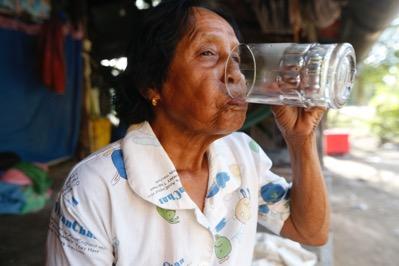
We helped local authorities conduct public forums, where community members could raise concerns or suggest improvements to the service providers and hold local authorities to account to respond to the needs of people, especially those most marginalised.
Following the forums, several private water suppliers discounted the connection fee for poorer families and for some schools, health centres and commune offices. During a baseline data collection, only 33 percent of people were satisfied with the water service and quality and after WaterAid’s work, during the end-line data collection, this had increased to 67 percent. The evaluation also found improvements in the capacity of water operators to monitor water quality and similar efforts are now being used by other water operators.
Strengthened service provider accountability for improved rural water services requires strong collective action and everyone who is a part of the system must be engaged and empowered to fulfil their roles and responsibilities. WaterAid’s adaptive way of working and supporting emerging momentum enables us to respond quickly to the rapid changes in the water supply context.
WaterAid/ Remissa Mak
Strengthened service provider accountability means people like Sorn, 62, can access safe water for drinking.
WaterAid
WaterAid helped train suppliers to fix issues and provide maintenance, such as this pipe that was leaking water and slowing supply to villages.
As a result of this work, the Cambodian Water Supply Association’s evaluation highlighted a significant improvement in user satisfaction following the intervention.
Sanitation
WaterAid
How one village built a toilet for every house
A decent toilet is something everyone should take for granted – at home, school, work and in public places. It’s a basic human right that protects people from dangerous diseases and provides dignity. In the village of Falitehu, this was not the case.
Falitehu is a sub-village in the Manufahi Municipality of TimorLeste. A very isolated town, there are only 22 households and 235 people living in the village. Community members must walk for hours if they need to reach the town of Manufahi for supplies or medical care.
Mr. Evaristo, 40, is the sub-village chief of Falitehu and actively involved in improving sanitation and hygiene in the village.
When speaking with WaterAid, Mr. Evaristo, told the story of a 9-year-old boy was bitten by a pig, after he went to defecate in the pigsty, because the village did not have toilets. The family tried to rush the boy to a hospital, but his life was lost due to the injury. In collaboration with Mr. Evaristo and local partner Luta ba Mudansa (LBM), WaterAid worked to improve sanitation and hygiene in Falitehu.
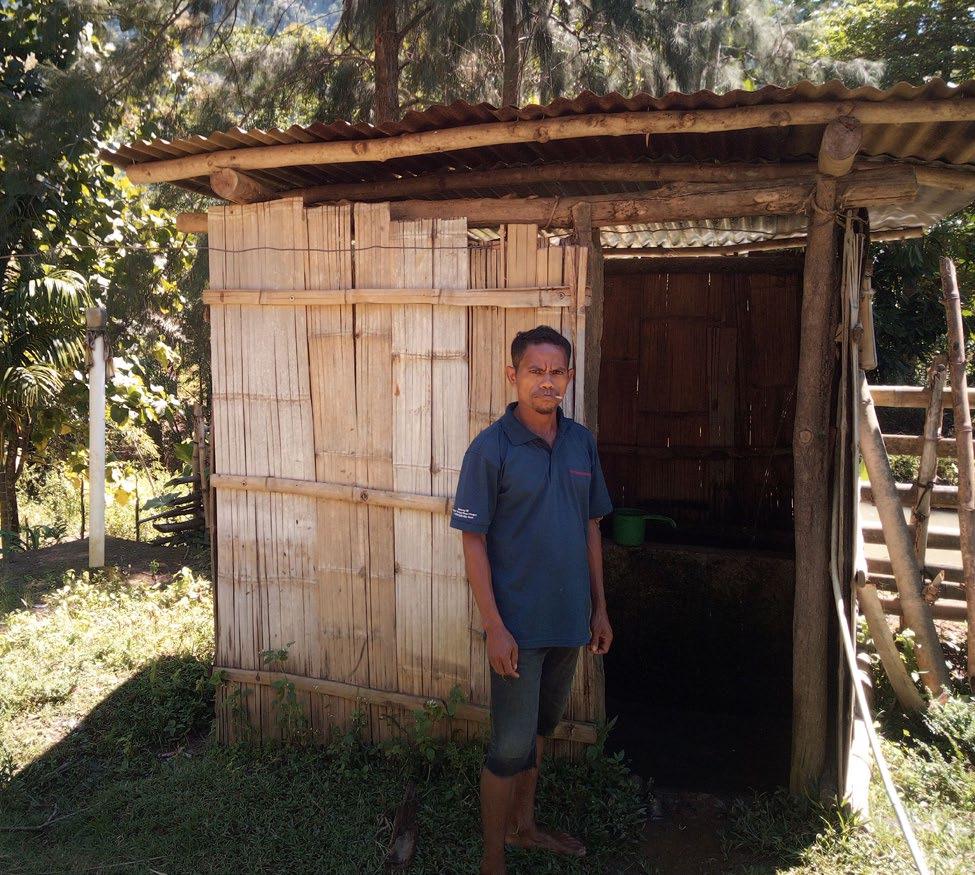
Across three years, WaterAid and local partners spent time educating locals on the importance of a decent toilet, safely managed sanitation and good hygiene, as well has how to build and maintain a safe toilet.
As a result, by 2020, every single
household in the village had
built their own toilet,learnt how to maintain it and become accustomed to the change from open defecation, with Mr. Evaristo stating nobody in the village open defecated anymore, using only the safe toilets.
On WaterAid’s intervention, Mr. Evaristo (pictured) said:
“It has reinforced us the community to improve our toilets, and being the chief, I keep supporting to motivate the community to use proper toilets, wash their hands before having meal, after using toilets or touching any dirty things in order to prevent them from various diseases, like worms, Diarrhoea and others. As result of this program, all 22 household have their own [toilets] and should we have more new families, I will keep reminding them to do the same like others.”
Hygiene
A boy in Sambour village reading Mongkul’s story.
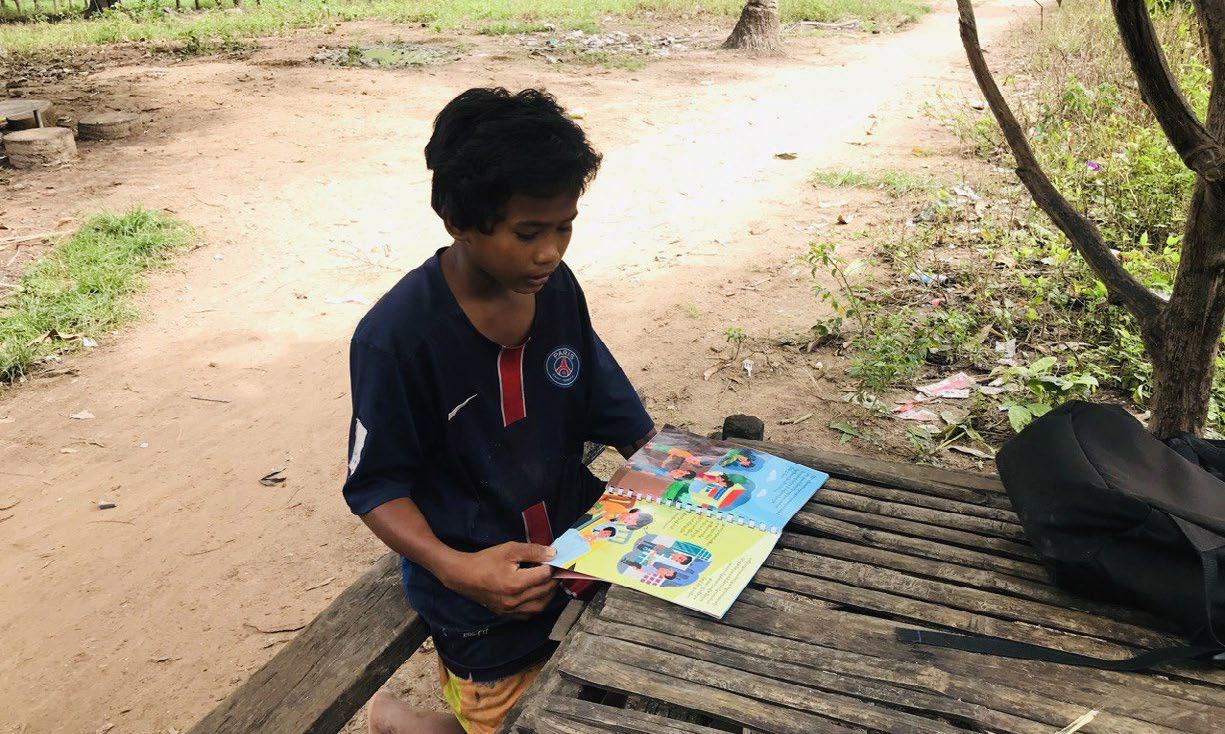
Making clean water and clean hands normal in Sambour district, Cambodia
Once upon a time there was a boy called Mongkul. Mongkul is 12 and lives with his mother and his younger sister Neary. Mongkul and his sister often drink untreated water from the river and they defecate in their yard or nearby bush, because they don’t have a toilet.
Mongkul is actually a fictional character, but his daily experience is that of many children living in communities in Sambour, a remote district in Cambodia. In some communities in Sambour, over half of children under five suffer from stunting due to long-term chronic diarrhoea and inadequate nutrition.
Underlying these statistics is the challenge that behaviours such as treating drinking water, using a toilet and washing hands with soap after toileting, and before cooking or eating were not ‘normal’ in these communities.
For over a year, WaterAid worked with community leaders in Sambour to understand the motivating factors and dynamics in communities that reinforce their daily norms.
With this knowledge, WaterAid in Cambodia created the character of Mongkul– an ordinary child who was worried about his sick sister, Neary, and used lessons he learnt at school to convince his family they should start washing their hands, boiling their water and using a toilet, becoming role models to the entire community.
WaterAid planned to roll out Mongkul’s story through schools, community story nights with village leaders, monks and the Sambour local government, as well as competitions for families to aspire to become role model families like Mongkul’s. However due to COVID-19 restrictions, community volunteers instead went house to house, lending Mongkul’s story for bored children to read at home, and sticking motivational stickers on 20L reusable bottles of treated water.
They put up banners in their communities with the story of Mongkul and his role model family alongside official COVID-19 advice. Since sharing Mongkul’s story in Sambour, changes have already been seen, including:
•Children who read the story book have recited the story to their own family and to other children in their village.
•Families have been eager to register for ‘role model family’ competitions and demonstrating the key behaviours from the story.
•People are setting up places at home to wash their hands with soap.
•Many new toilets are being constructed and people are purchasing locally produced biosand filters to treat their drinking water.
There is still a lot to do to overcome stunting and health challenges in Sambour, but we can see that our approach is starting to change behaviours.
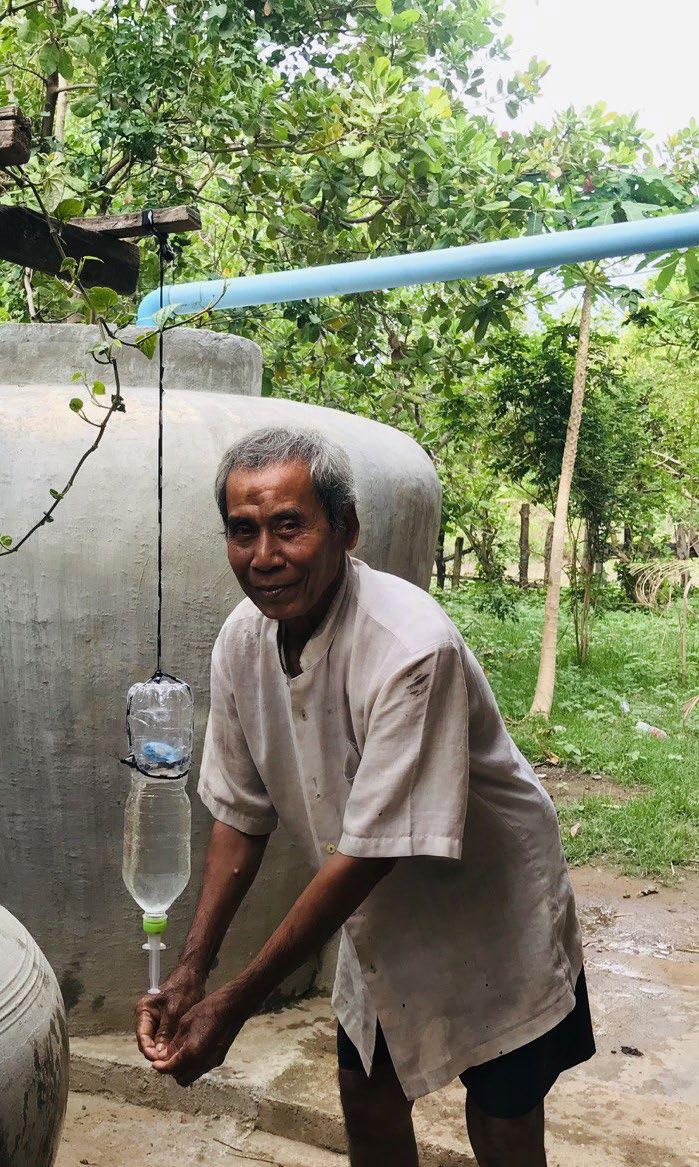
A man in the village demonstrating the new handwashing device.
Papua New Guinea
Using our systems strengthening approach, we supported the Papua New Guinea Government to develop, test and refine strong, inclusive and sustainable approaches for the delivery of water, sanitation and hygiene (WASH) services.
As a key partner of the Papua New Guinea Government, WaterAid worked closely with the Department of National Planning and Monitoring (WASH PMU), the Wewak District Development Authority and the Motu-Koita Assembly to support implementation and rollout of the National WASH Policy.
At a national level, we supported the WASH PMU to develop Papua New Guinea’s first National WASH monitoring system. The monitoring system is used by national and sub-national government and WASH sector stakeholders for the collection, management and use of data. Quality and timely data is critical for driving long-term improvements to evidence-based planning, sector coordination and allocation of critical resources to WASH services.
Other achievements included:
•In Wewak District, we worked with the Wewak District Development Authority to implement a holistic approach for the delivery of quality WASH services. Through technical training, capacity building and support of government staff we have reached many households and community members with improved WASH services, and will reach many more as the program continues.
•WaterAid PNG packaged COVID-19 awareness and preparedness, gender, disability, social inclusion and family violence referral pathways into our service delivery model. The resulted in an increase in the capacity and confidence of key government staff, which has positively impacted the implementation of inclusive WASH services in accordance Wewak District’s five-year WASH plan. • WaterAid engaged in WASH projects with Motu and Koitabu people, the traditional landowners of the greater Port Moresby area, residing in eight traditional periurban villages on the Coral Sea coast and nearby inland areas.
•Motu-Koita villages experience poor WASH services, high density living and law and order challenges. WaterAid worked with the Motu and Koitabu representative body the Motu-Koita Assembly (MKA) to undertake COVID-19 awareness and preparedness through direct outreach and a targeted social media campaign. In collaboration with MKA, WaterAid undertook major upgrades of the urban water supply network in Pari Village, providing safe water supply to Pari’s 6,000 residents.
WaterAid/ Tom Greenwood

Doris outside her home. Doris and her family struggled with both the cost of water and lack of supply. Port Moresby, Papua New Guinea.
List of funders:
•Australian Government’s Gender Action Platform (in partnership with Marie Stopes International) • Australian Government’s Water For Women Program • Armani’s Acqua for Life • National Department of Planning and Monitoring (through World Bank Water supply and sanitation development program) • ANCP • Australian Government Economic and Social Infrastructure Program • Australian Government Church partnership Program • Who Gives A Crap • Church of Latter-Day Saints Charities (LDSC) • Corporate, foundation and supporter contributions
Expenditure: $1,741,842
Locations of projects
Port Moresby, Central Province, East Sepik Province
Local partners
•Department of National Planning and Monitoring • • • • • • • • • • • National Department of Health National Department of Education East Sepik Council of Women (ESCOW) East Sepik Provincial Administration East Sepik Provincial Health Authority Wewak District Development Authority East Sepik Disabled Persons Association Motu-Kiota Assembly Water PNG Eda Ranu Ltd East Sepik Assembly of Disabled People (East Sepik ADP) • Integrated Rural Development Initiative (IRDI) • • • • • Marie Stopes International (MSI) National Research Institute (NRI) Netball PNG Water PNG Wewak District Development Authority
Cambodia
With our focus on responding to COVID-19, WaterAid Cambodia continued to ensure in all work, marginalised groups were targeted and supported.
The team continuedto influenceWASH policy change and institutional accountability through engagement with national and sub-national administrations,to prioritise WASH and mobilise resources to support marginalised groups during COVID-19.
WaterAid identified that constructionand brickworkers were particularly vulnerable due to their living and working conditions and that the governmenthad notprovided a targeted response tothisgroup. WaterAid supported this group by initially providing online training on COVID-19 prevention messages, awareness-raising and hand hygiene practices to the Building and Wood Workers Trade Union of Cambodia. WaterAid also helped the group to install handwashing facilities. Wealsocreated a demonstration video that was sharedwithworkerswho establishedhandwashing facilities in a number of worksites. WaterAidalsoworkedwith marginalised groups from construction sites and brick kilns by providing them with much needed personal protective equipment.
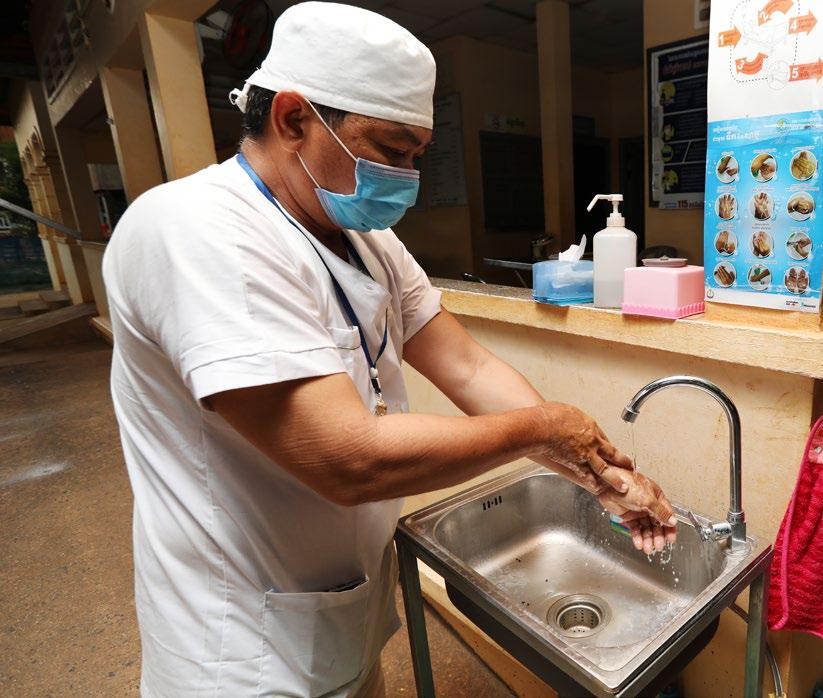
Other achievements included:
•WaterAid Cambodia continued its focus on gender and equality by establishing a crosscutting gender working group that ensured all of the programmatic work at WaterAid Cambodia prioritised gender inclusive WASH. The effects of a lack of clean water and decent toilets are felt most by women and girls. The impact of this working group will ensure those most affected by WASH challenges are included in the solutions, as getting women and girls involved is key to successful WASH services.
•WaterAid reactivated the Women in WASH (WiW) network in Cambodia TheWiWis led bywomen who are WASH professionals from across government, non-governmental agencies and the private sector it provides a platform for sharing knowledge, challenges, solutions, networking and peer support. WaterAid attracted eighty-two qualified women from public institutions, civil society organisations, and private entities at national and sub-national levels to join the network. Once again, WiW works to
WaterAid/ Remissa Mak
Sinon (48) washing his hands in front of the Thlork Vien health centre, Chhouk Village, Thlork Vien Commune, Samaki Meanchey District, Kampong Chhnang province, Cambodia.

Expenditure: $2,040,083
List of funders:
•Australian Government (ANCP, The Water for Women Fund - Research) • Who Gives A Crap • H&M Foundation
•Swedish International Development Cooperation Agency - SIDA • Swedish Postcode Lottery • UNICEF - Accelerating
Sanitation and Water for
All • VF Corporation • WaterAid UK - Innovation Funds
•Mr. Harold Bentley
ensure those who fill the impacts of lack of access to WASH the most are involved in the solutions.
•WaterAid celebrated the launch ofthe Clean Frontline project, working closely with the department of hospital service (DHS) of the Ministry of Health, which aims to train hospital cleaners leading to cleaner and safer delivery of healthcare services. With 13 hospital participating in the project, WaterAid worked to expand our scope of influence on healthcare services because the impacts of this project are life changing, with improved cleaning practices essential for reducing healthcare-associated infection, including the spread of COVID-19 and tackling antimicrobial resistance.
Partners:
• • • • • • • • • • Ministry of Rural Development Ministry of Health University of Health Science (UHS) National Institute of Public Health Department of hospital service (DHS) Provincial Health Department WaterSHED Rainwater Cambodia Epic Arts Building and Wood Workers Trade Union Federation of Cambodia • • • • • WASH journalist Network Humanity & Inclusion (HI) Ministry of Women’s Affairs World Wide Fund for Nature (WWF) London School of Hygiene and Tropical Medicine • • • • • WASH Skills Development Organisation Centre for Sustainable Water Cambodian Water Supply Association (CWA) Sovann Phoum Cambodian Disabled People’s Organisation (CDPO) • • • • Sevea Consulting Teuk Saat 1001 Youth Groups Gender and Development for Cambodia (GADC) • • • Green Lady COCD Saory
Locations of projects:
• • • • • Kampong Chhnang Kraite Kandal Kampong Speu Svay Rieng
Timor-Leste
Maintaining our strong partnerships in Timor-Leste was vital for our continued success.
We focused on continuing close partnerships with rights-based and women’s groups, who supported our project delivery, research, advocacy and influencing. At the national level, WaterAid worked with rights advocacy organisations and women’s groups to lobby the national parliament for more budget allocation to water, sanitation and hygiene.
Other achievements included:
•WaterAid Timor-Leste continued to progress on improving household latrines to the ‘hygienic’ level, in the areas we work, as well as supporting healthcare facilities to have appropriate WASH facilities, and working with schools to provide inclusive facilities.
•WaterAid actively participated in Governments National Taskforce to respond to COVID-19, working to reinforce the importance of utilising existing sector information, capacities, and mechanisms in response efforts.
•InLiquiçáand Manufahi WaterAid supported the municipal WASH team and civil society groups to be active members of the Municipal COVID-19 Taskforce. Initially, with few local voices represented in coordination mechanisms WaterAid identified a critical need to support representation of local partners and civil society, to ensure they have an active role and opportunity to gain experience. • WaterAid was able to provide direct support; including public handwashing stations, hygiene messaging materials, media broadcasts and messaging reaching rural communities in the target districts.
•We integrated climate resilience into our rural WASH project activities. This work supported incorporatingclimate change resilience into guidelines and facilitator training. This continues to be rolled out in communities and in schools, through ourcommunitybasedmodules.
WaterAid/ Vlad Sokhin
Local partners
• • • • CARE International Marie Stopes International Engineers without Borders RHTO (Ra’es Hadomi Timor Oan - Disability People Organisation) • • Local implementing NGOs GFFTL (Grupu Feto Foinsae Timor-Leste - national women group) • • FE (Feto Enginheira - engineering women group) FLBF (Fundasaun Luta ba Futuru - local NGO)
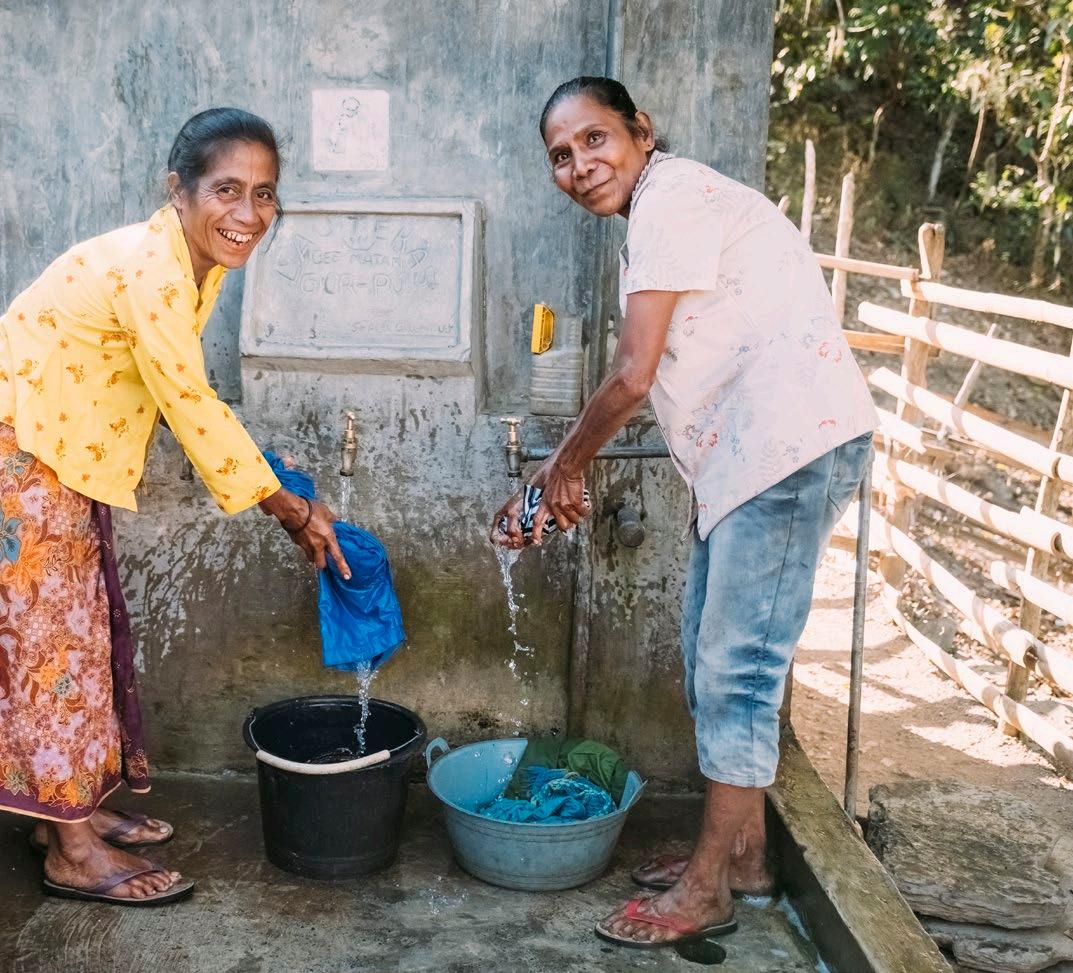
Isabel Soares, 55 (left) and Olinda da Silva Nunes, 59 (right) washing clothes in a bucket using water from the community tap stand. Lautekas, AI Technology Community, Timor-Leste.
Location of projects
•Dili, Liquiçá, Manufahi
Expenditure: $2,126,636
List of funders
•Department of Foreign Affairs and Trade (Water for Women, ANCP, ANCP GAP)
•Partnership for Human Development
•Who Gives A Crap
•WaterAid UK
•Corporate, foundation and supporter contributions
•The U.S. Department of Agriculture
•FHTL (Fundasaun Hafoun Timor Lorosae - local NGO) • Asosiasaun HAK (national human right organisation) • PN-BESITL (Plataforma Nasional Bee Sanementu no Ijinene Timor-Leste - national WASH civil society network) • FAS (Feto Asaun ba Sustentabilidade - local women group) • LBM (Luta ba Mudansa - local youth group/NGO) • • CBM University of Technology Sydney Institute for Sustainable Futures (ISF) • AGMFs (Asosiasaun GMFs - Municipality Association of Water User Groups) • • GMFs (Local Water User Groups) Government of the Democratic Republic of Timor-Leste and local government departments in Liquiçá and Manufahi (JSM and VERMO) • Similie
Myanmar
The Supporting Safer Births Project in Myanmar has been funded through DFAT’s Water for Women program and WaterAid UK since 2018.
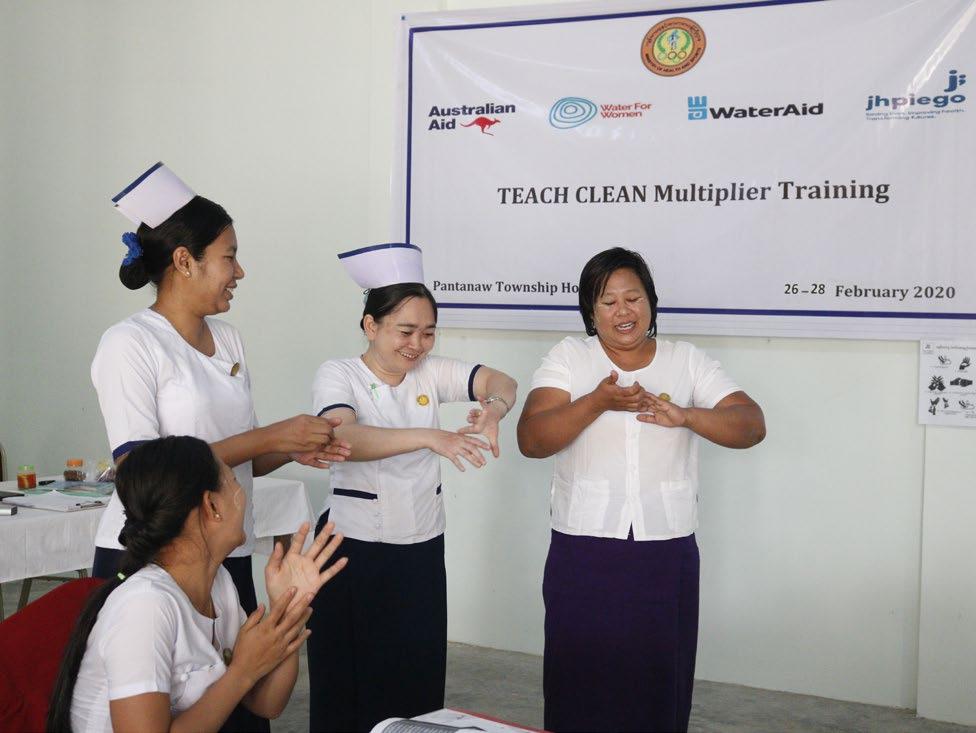
Due to the increasing civil and political unrest in Myanmar since February 2021, our work under the Supporting Safer Births Project has been unable to continue.
The goal of the project has been to improve the quality and safety of healthcare that mothers and babies receive at the time of birth. A key focus was to carry out training sessions related to COVID-19 in healthcare facilities, including topics such as the use of personal protective equipment, how to perform COVID-19 rapid testing, environmental cleaning in hospital settings, healthcare waste management and triaging of patients. To ensure healthcare facilities were supported to respond directly to COVID-19, the project also distributed consumable items such as soaps and plastic garbage bags.
The ongoing civil and political unrest in Myanmar has meant WaterAid’s work has been unable to continue and is currently phasing out. However, in order to meet urgent needs resulting from the pandemic and political crisis, WaterAid is
Handwashing demonstration by a cleaner together with the trainers at Pantanaw Township Hospital.
Expenditure: $921,676
List of funders
• • DFAT’s Water for Women WaterAid UK
Locations of projects • Ayeyarwady
Local partners • Jhpiego
redirecting efforts towards humanitarian water, sanitation and hygiene (WASH) programming, targeting some of the most vulnerable populations in communities where access to WASH services is scarce.
India
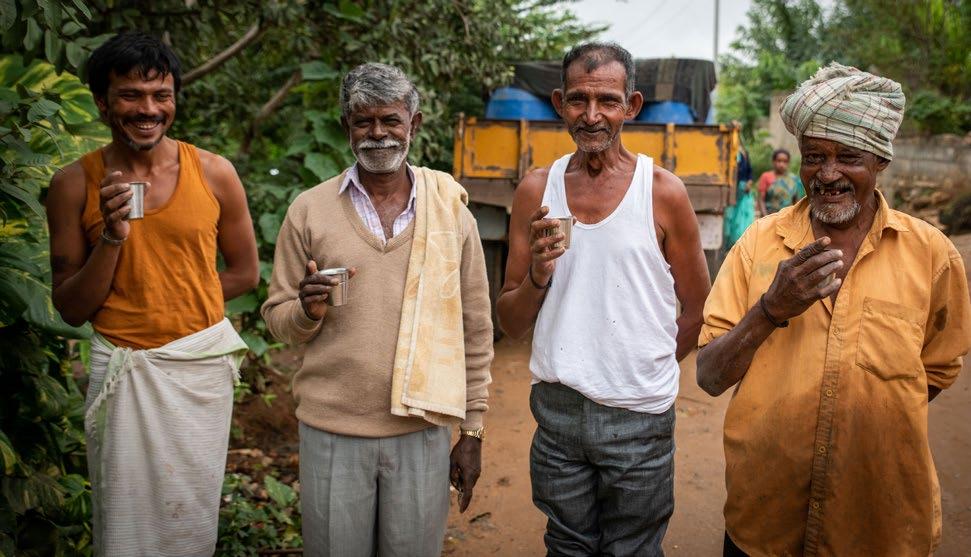
Our vital work with sanitation workers in India continued, strengthening the rule of law to advance rights and freedoms of manual scavengers
Manual scavenging is an age-old inhuman sanitation work tradition in India, mostly associated with caste and social hierarchies. Manual scavengers are from the most marginalised sections of society, empty and collect human waste from insanitary dry latrines, and carry it on their head to the disposal area on a daily basis.
Women manual scavengers are subjected to social discrimination and stigma by society, and face systemic exclusion from basic health and education services, government schemes, social security measures, and alternative livelihood opportunities.
In this context WaterAid India:
•Implemented 36 selfhelp groups, reaching 1,139 women engaged in manual scavenging, formed across 36 urban/ peri-urban settlements in project locations in four states. 36 community resource persons were also identified and trained across project locations, to provide support to self-help groups and undertake field-level initiatives.
•Posters and flyers on rights and freedoms of manual scavengers were published and distributed among communities and over 1,000 pamphlets on COVID-19 prevention measures were distributed across community members.
•Food support was provided to 1,800 people from the manual scavenging communities during the COVID-19 pandemic. Community kitchens were also organised, where 823 persons from the manual scavenging community were supported • Three short films were prepared, highlighting various aspects of challenges faced by manual scavengers to raise awareness • A number of media advocacy interventions were undertaken to highlight the key issues for policy makers and the public through opinion pieces in newspapers, a radio programme and a social media campaign. • A baseline study was undertaken in 2018 across 36 project locations in four states to collectreliable data, which highlighted the prevalence of dry latrines and the practice of manual scavenging, and various challenges faced by the communities engaged in this work.
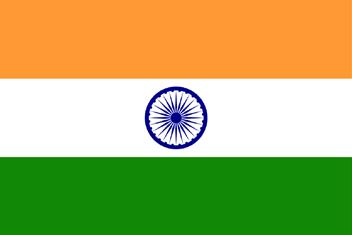
Expenditure:
$150,000
List of funders
•Who Gives A Crap
Locations of projects
•Bihar • Jharkhand • Madhya Pradesh • Uttar Pradesh
WaterAid/ CS Sharada Prasad/ Safai Karmachari Kavalu Samiti
(L-R) Muniraju, 37, Kaverappa, 54, Somappa, 52, Krishnappa, 65, all manual pit emptiers stand having a drink together, in Bangalore, India.










